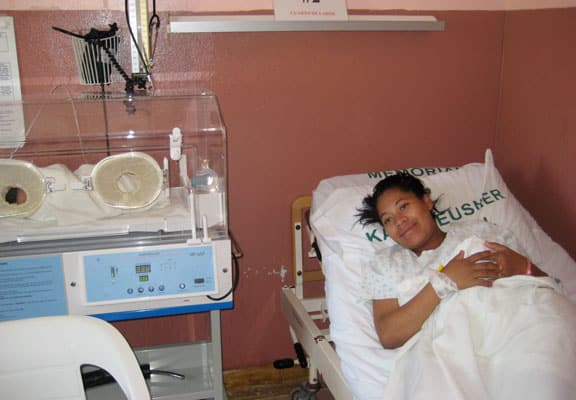

BELIZE CITY, Belize (WOMENSENEWS)–The young woman lying in the small, cheerfully decorated recovery room was still groggy, but she was fully aware of her new role: being a mother.
She had just delivered her first child at the Karl Heusner Memorial Hospital in Belize City, where she was encouraged and coached by a nurse to start breastfeeding her healthy, hours-old baby boy.
In Belize every woman’s pregnancy and delivery is under the microscope of the Millennium Development Goals, U.N. anti-poverty pledges made by governments that are due in 2015.
“We had zero maternal deaths in 2011,” said Dr. Natalia Largaespada-Beer, director of maternal and child health for Belize’s Ministry of Health, in an email interview. “Every obstetric emergency is considered a national emergency.”
To meet its goal of 10 maternal deaths for every 100,000 live births, the country with a population of only around 400,000 people–and just 7,000 women or so who give birth each year–will have to keep that up.
Amikole Aminata Maraesa, an American doctor of anthropology who lived in southern Belize in 2006, explains the math.
In 2009, she said, the country’s maternal mortality ratio was 54 deaths per 100,000 live births. Sounds high, but in raw numbers it meant four deaths out of about 7,407 births.
Huge National Sway
With each woman’s life and death holding huge sway over its national statistic, the country offers a snapshot of public health services that seem to be working, even during a hard economic downturn.
The poverty rate in Belize jumped to 15.8 percent in 2009 from 10.2 percent in 2002, a startling 46 percent increase that would presumably contribute to health deficits in both rural and urban areas.
Many doctors come from Cuba to work in hospitals and clinics and to help the government provide services.
Staffing and supply shortages plague hospitals and rural clinics, but many institutions are still making gains. Since 2008, for instance, a handful– Karl Heusner Memorial Hospital in Belize City, Northern Regional Hospital in the northern part of the country and Corozal Community Hospital–have received a UNICEF “baby-friendly” designation showing their commitment to fostering breastfeeding.
Largaespada-Beer said some of the strategies Belize has implemented include distribution of iron and folic acid to females ages 10 to 49 to reduce anemia and the risk for postpartum hemorrhage.
The country provides mobile and community clinics that treat the leading causes of mortality in women, such as hypertension during pregnancy among women with hospital deliveries and postpartum hemorrhaging among those who deliver at home.
Dispensing Nourishment
The government dispenses prenatal and postnatal vitamins and fortified food for pregnant and postnatal moms who are at risk or undernourished.
The percentage of births attended by a skilled health professional rose to 94 percent in 2010, up from 79 percent in 1995, according to a report by the Ministry of Health.
Early initiation of breastfeeding increased by 51 percent between 2006 and 2010, according to a UNICEF report.
Among Belize’s diverse population, those least likely to breastfeed exclusively for the crucial first three months were better-educated women, mostly from urban areas and with careers, and within the Creole community, the country’s ministry reports. The highest rate of exclusive breastfeeding was among the Q’eqch’i Maya and women who gave birth at home.
While the benefits to infants are more commonly emphasized, studies have also shown that breastfeeding helps with postnatal weight loss and reduces the risk of postnatal hemorrhage and breast, ovarian and uterine cancers.
The government also promotes institutional–versus home–deliveries and more skilled birth attendants. Although many rural women prefer to give birth at home around their families, they can now also call an ambulance that arrives with a midwife in case of an en-route delivery.
Leah V. Bennett, a journalist for more than 16 years, lives in Staten Island, N.Y., and is currently an editor and Web producer for The Asbury Park Press in Neptune, N.J. She also volunteers with the International Health Professions Network, which has been bringing free health and dental care to developing countries for more than 20 years.
Would you like to Comment but not sure how? Visit our help page at https://womensenews.org/help-making-comments-womens-enews-stories.
Would you like to Send Along a Link of This Story? https://womensenews.org/story/reproductive-health/121219/belize-has-zero-tolerance-maternal-mortality

